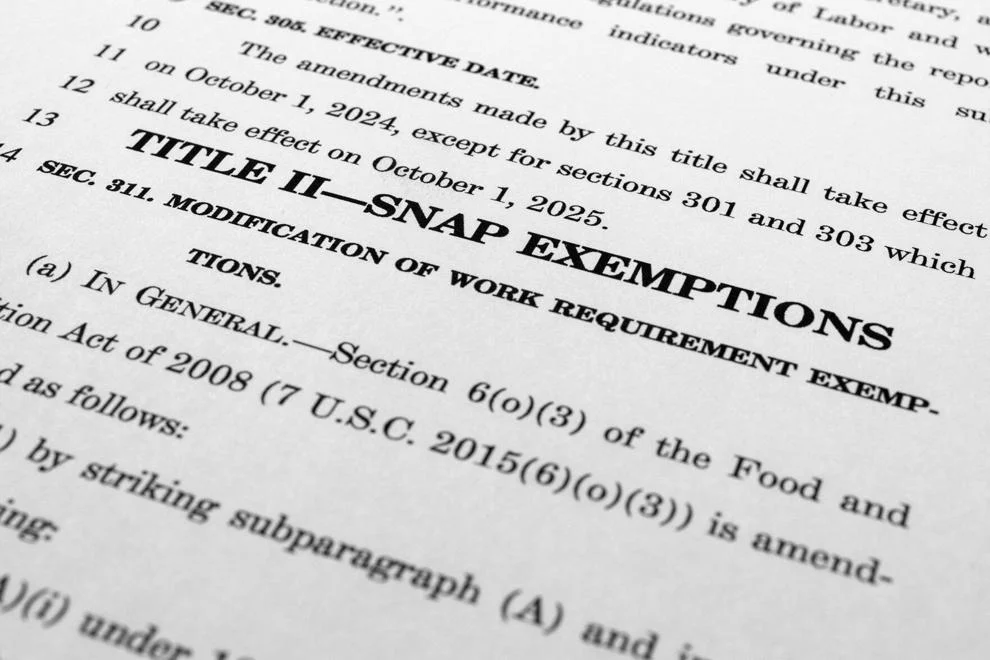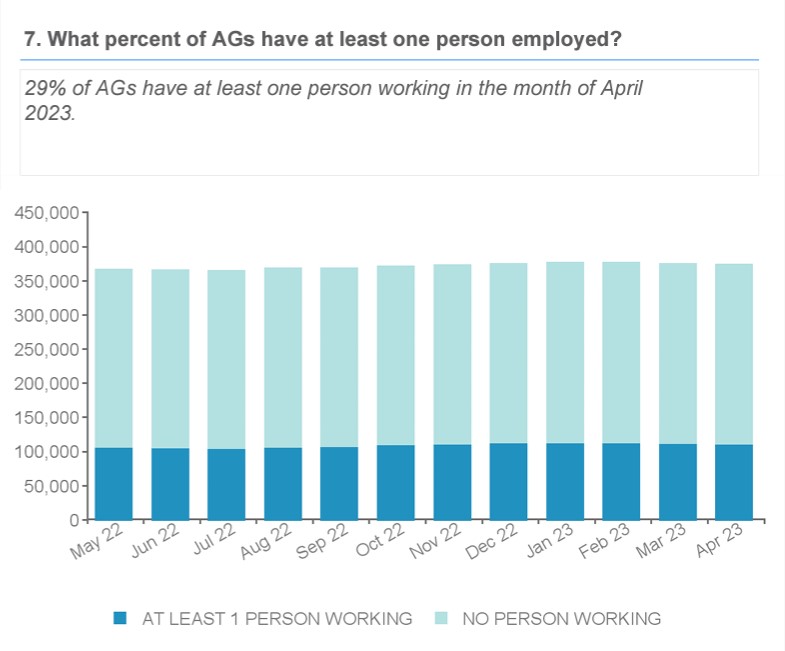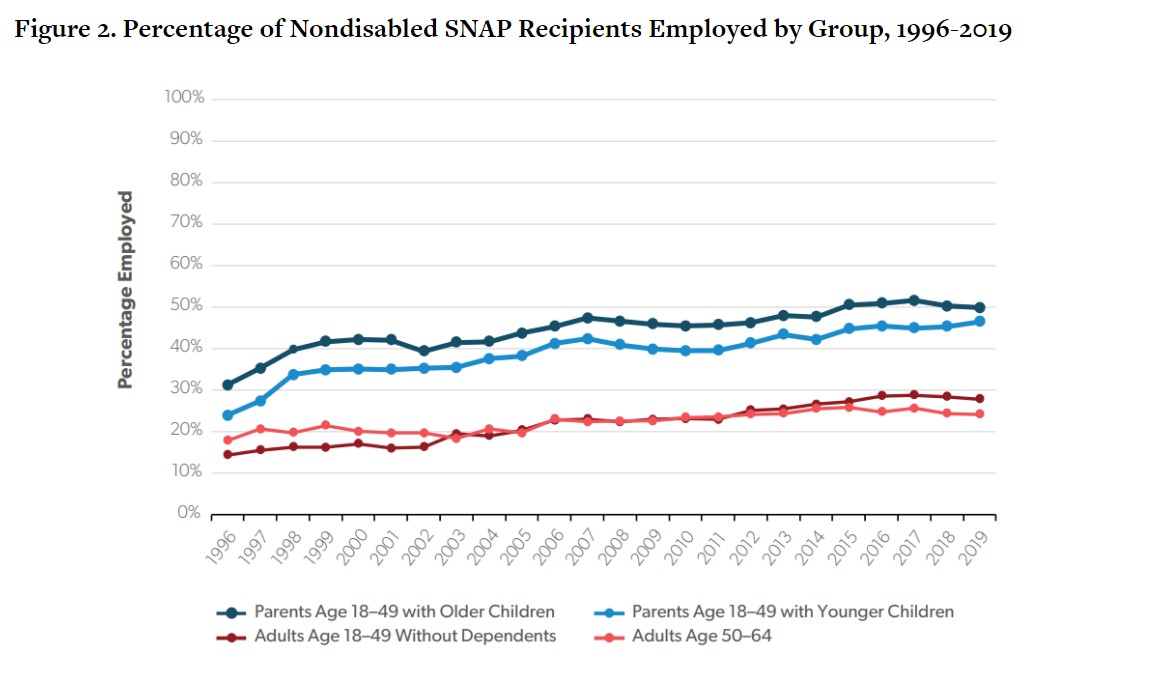
The Debt Limit Bill Temporarily Expands Work Requirements for Some…But Eliminates Them Entirely for Others
Wisconsin Voters Want Welfare Recipients to Work; The Left Wants Them to Stay Dependent
The Bailout Bill May Allow Milwaukee’s Guaranteed Income Welfare Program to Take Wing
President Biden signed a bipartisan debt limit bill this weekend that drew both support and opposition from both sides of the aisle and is taking arrows from all sides. Among the provisions that have drawn heat are those surrounding work requirements for Supplemental Nutrition Assistance Program (SNAP, also commonly called Food Stamps) recipients.
Republicans pushed for changes to boost the age of those required to work or get worker training for Able Bodied Adults Without Dependents (ABAWDs) receiving benefits. Currently, the 20-hour-a-week work requirement does not apply to recipients over 49; the agreement would boost the age to 55, but only temporarily. The bill phases in the age increase from 49 to 54 over a 3-year period. Five years later, the provision expires.
While requiring able-bodied childless adults between 50-54 to work, get work training, or volunteer 20 hours a week is a move in the right direction, under the provision ABWADs can still stop working a decade earlier than a wide swath of the workers who fund their benefits. And after the provision expires in 2030, the age reverts to 49.
Should Able-Bodied People Over Age 49 Have to Work?
According to the Bureau of Labor Statistics (BLS) in the first quarter of 2023, about 34% of workers over 18 are 50 and older, and 24% are over 55.
The population is aging, more people are working longer, workforce shortages continue to grow, and the burgeoning welfare rolls place an increasing burden on workers, taxpayers, and government. Asking able-bodied welfare recipients 50-54 without dependents to work part-time helps correct the egregious inequity that forces working seniors to subsidize benefits for younger able-bodied welfare recipients who don’t have to even look for a job.
Many argue even age 54 is too young to stop expecting able-bodied adults to work considering about a quarter of current workers are above that age, and it’s over a decade below normal retirement age.
Who Opposes Able-Bodied Adults Working?
Predictably, the left opposed the age increase.
To get the age upped to 54 even temporarily, Republicans were forced to agree to drop the current 20-hour a week training/work requirement completely for all able-bodied veterans, young people aging out of foster care, and homeless people – of any age.
According to the Congressional Budget Office, the net result is that program spending will go up roughly $300,000 million as an estimated net 80,000 recipients will be added to the rolls.
The savings found by moving people 50-54 into the workforce are outweighed by exempting the large groups of able-bodied workers across all age groups.
Are Able-Bodied Adults on Welfare Already Working?
NBC news coverage of the provision states that “most families” receiving SNAP are working, parroting a talking point from many on the left. Since SNAP benefits are not based on family units but assistance groups (assistance groups may include related and unrelated members living in the same household who purchase and prepare meals together) we assume NBC is misusing the word family in this context.
According to Wisconsin’s numbers, NBC is also misusing the word “most.” According to the state Department of Health Services (DHS), 71% of assistance groups (AGs) have no person in the household working, and only 35.7% of adults receiving benefits are employed.
According to the American Enterprise Institute (AEI), nationally the SNAP groups with the lowest employment levels are also the groups growing the most. Adults between ages 50-64 are now the largest group accounting for 28%, having doubled since 1997. About 12% are ABWADs from 18-49, and although a much smaller age group able-bodied adults 50-64 account for an even larger share, about 14%. The rate of employment in both these groups – over a quarter of SNAP heads of household – is well under 30%. Parents (non-disabled) 18-49 have employment rates about 20 percentage points higher, but still under 50%. (Graph below from AEI)
AEI calculates about 1 in 4 SNAP recipients are able-bodied adults with no apparent reason not to be working.
Available Wisconsin data seems to bear some of this out; income for adults on SNAP age 50-64 is under $300 a month, less than one-third the income for the 35-49 age group.
Work Is Key To Escaping Poverty, But the Left Rejects Work and Work Training
The left never addresses how an able-bodied homeless person might raise themselves out of poverty without a job, or why gaining work experience – and wages – is a negative for an able-bodied teen. Or why a young able-bodied veteran shouldn’t work, get training, or volunteer.
In fact, a left-leaning think tank, the Center for Budget and Policy Priorities, says it’s obvious people will work because they get “a lot more in paid employment than they’ll get through SNAP.” Yes, a job would pay more than SNAP benefits; the difference is a job requires work for the pay.
With 2.4% unemployment in Wisconsin, we should be pushing every able-bodied adult into the workforce. No able-bodied, childless 52-year-old will suffer harm by having to find work; rather, a job will help lift them out of poverty.
Yet Congresswoman Gwen Moore voted against the bill, calling Republicans “terrorists” who were blackmailing the entire world to vindictively take “a pound of flesh” from largely black and brown poor women, by forcing them to work if they wanted benefits. (Moore also that the work requirements applied to Medicaid, which – unfortunately – they do not, so it’s unclear she thoroughly understood what she voted against.)
The question of whether able-bodied, working-age adults – childless or not – should be expected to work, seek work, or get worker training is one where the populace parts ways with current policies. Little has changed at the national or state levels as few conservatives have championed work as the surest means to decrease generational dependence on entitlement programs, afraid of political repercussions.
Wisconsin Voters Have Spoken
Wisconsin voters went to the polls in April weighing in on whether able-bodied working-age adults on welfare should be required to seek work to receive benefits.
Their opinion was a resounding ‘Hell yeah they should!’
The vote split 80%-20% with more than 1.4 million Wisconsinites voting yes. It’s not because Wisconsin is mean spirited or only archconservatives voted. Indeed, these same voters who by a super-supermajority said people who can work should work also by large majority elected an extreme liberal to the state Supreme Court.
It’s because regular people understand there must be a limit to providing benefits to people who can work but won’t. They understand it’s not fair that a single mom working to support her own family is forced to pay taxes to support an able-bodied childless adult who can’t be bothered with the hassle of a job.
Yet the left pushed hard against the ballot question. Wisconsin’s Senate Democratic leader claimed simply asking the question on the ballot was an attack on low-income people. Governor Evers called the question ridiculous because welfare recipients already work. The League of Women Voters said it was just too confusing and that there should be exceptions.
Democrat lawmakers from state to federal level are united in saying there “are already work requirements” and that most welfare recipients are already working. Of course, the Biden Administration ended all work requirements in Medicaid after taking office, and we’ve covered the SNAP working numbers in Wisconsin above and welfare and work here.
Wisconsin’s Growing Welfare State
In addition to the more than 700,000 SNAP recipients, more than 1 in 4 Wisconsinites is on Medicaid. In April 304,952 of those MA recipients were childless adults and another 155,290 parents/caretakers.
Discussions about welfare work requirements typically carefully wall off recipients who are parents, even though working parents across the state finance welfare benefits for other, often generational welfare recipients who are also parents. The federal debt ceiling bill only impacted childless adults.
The state unemployment rate in April was 2.4%, a historic low, yet the Medicaid rolls have been steadily increasing for 4 years.
Even with the record-low unemployment, and with the expiration of the federal mandate requiring people be kept on MA even if they no longer qualified for benefits, so far in 2023 Wisconsin taxpayers started funding MA benefits for 7,000 additional ABAWDs and 4,000 new parents/caretakers.
There are now 90,000 more SNAP recipients now than in 2019, an increase of over 12%, and base level benefits have been substantially increased.
Welfare rolls are growing, workforce participation rates are falling, and available jobs are increasing. If low-income people want to become higher income work is involved: a part-time job, a better job, or a full-time job.
Welfare is supposed to help low-income people while they can’t help themselves, not so they don’t have to help themselves.
Barring inheritance, a lottery win, or a lucky sweepstakes entry, that has almost always taken the form of work.
Not so fast. Guaranteed Income and the Milwaukee Bailout
Madison has already put in place a guaranteed income pilot program where no-strings-attached cash welfare payments are made to low-income families; while they have received funding from private donors, city staff and state funds from DHS are also being used. They’re just one of several cities in Wisconsin (the ones so cash-starved they’re getting a large portion of the billions of surplus tax dollars which should be returned to taxpayers through tax cuts) that are looking at similar proposals.
Milwaukee Mayor Cavalier Johnson, who is lobbying hard for nearly a quarter billion a year in new sales tax revenues, co-sponsored legislation passed in 2020 creating a Guaranteed Income framework in Milwaukee which passed by a supermajority of the Milwaukee Common Council. Last year, Johnson reiterated his support for Guaranteed Income but said the city couldn’t afford to fund it in large part because of pension pressures. With new funds in reach and no prohibition in the Milwaukee Bailout bill preventing municipalities from instituting and administering Guaranteed Income programs, expect that to be next on the docket. And that super-majority vote is important; one of the few strings in the Milwaukee Bailout bill is that new program spending must get a 2/3 vote of the common council. Guaranteed Income has that level of support.
Guaranteed Income may well be one way Johnson helps sell the referendum (if that stays in the bailout bill) – Guaranteed Income payments made possible by the influx of cash can be used to reduce the burden of the new sales tax on locals.
There is a separate bill in the state legislature that would place limits on local Guaranteed Income programs, although Madison’s mayor says the bill wouldn’t apply to them, because they use private money. If this is the case, authors should consider amending the ban so that our overworked, starving local governments are not administering programs on behalf of non-profits, advocacy organizations or private donors. It’s a near-certainty that Governor Evers vetoes any Guaranteed Income bill that makes it to his desk. Why a complete ban on local administration, funding, or implementation of any Guaranteed Income or Basic Universal Income program was not included in the shared revenue/Milwaukee bailout legislation as a condition of receiving additional state aid or the new sales tax revenues is just another of the many unanswered questions about that bill.
The Next Steps
We were pleased to see national Republicans try to expand work requirements, though the temporary nature of the expansion and the concessions – which will doubtless stay in place when the rest of the provisions expire – undercuts the goal.
At the state level hope to see more legislation make it to the governor that follows up on the advice voters gave in the referendum. Hopefully the budget will include work requirement, drug testing and other welfare reform provisions in bills Evers vetoed last session. And it’s past time to undo the Doyle-era provision that allows deadbeat parents who don’t pay child support to receive SNAP benefits for themselves. That legislation has languished in the Republican legislature, and its time to send it to Evers, perhaps that too should be included in the bailout bill.
It’s sure Evers will veto welfare reforms sent to his desk. But after putting the work requirement question on the ballot, the legislature should follow the clear guidance that came directly from voters and work on welfare reform.

